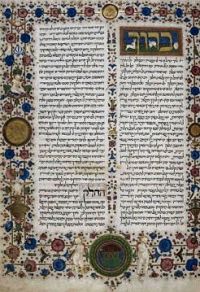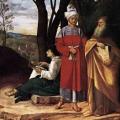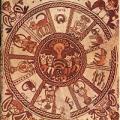158 - Born Under a Bad Sign: Freedom and Astrology in Jewish Philosophy
Abraham Ibn Ezra, Ibn Daud and Maimonides consider the philosophical implications of astrology as science flourishes in the Jewish culture of Andalusia.
Themes:
• Abraham Ibn Daud, The Exalted Faith, trans. N.M. Samuelson (London: 1986).
• I. Levin, Abraham Ibn Ezra Reader: Annotated texts with Introductions and Commentaries (New York: 1985).
• R. Fontaine, In Defence of Judaism: Abraham Ibn Daud. Sources and Structure of ha-Emunah ha-Ramah (Assen: 1990).
• G. Freudenthal, “Maimonides’ Stance on Astrology in Context: Cosmology, Physics, Medicine, and Providence,” in F. Rosner and S. Kottek (eds), Moses Maimonides: Physician, Scientist, and Philosopher (London: 1993), 77-90.
• B.R. Goldstein, “Astronomy and Astrology in the Works of Abraham ibn Ezra,” Arabic Sciences and Philosophy 6 (1996), 9-21.
• Y.T. Langermann, “Maimonides’ Repudation of Astrology,” in A. Hyman (ed.), Maimonidean Studies 2 (1991), 123-58.
• S. Sela, Abraham Ibn Ezra and the Rise of Medieval Hebrew Science (Leiden: 2003).
• I. Twersky and J.M. Harris (eds), Rabbi Abraham Ibn Ezra: Studies in the Writings of a Twelfth-Century Polymath (Cambridge, MA: 1993).
Stanford Encyclopedia: Abraham Ibn Ezra and Abraham Ibn Daud

Andalusia


 ..
..



Comments
Astrology & determinsim
It's worth pointing out that in many ways, the medieval discussion of astrology and human freedom is an early version of today's problem of scientific determinism and human freedom.
In reply to Astrology & determinsim by Berel Dov Lerner
determinism
Yes, I'd agree with that - basically we're talking about two kinds of causal determinism. However there are various issues that arise in the astrology case that don't arise in the modern science case, in particular the idea (already found in the Stoics) that the determinist system is not just necessitated by unbreakable causal chains, but also selected because it is the best possible outcome. Modern science doesn't have that additional layer of providential determination. One way to see the significance of this is that if you asked an astrological determinist or Stoic what would happen if the world started again from scratch, they would be likely to say (the Stoics did say) that exactly the same sequence of events would unfold, since God is going to ensure that it does as it is the best possible outcome. Whereas a modern day scientific determinist might or at least could say that things unfold both randomly (things could have been wildly different) and necessarily (in the sense that once the random starting conditions are in place, everything will unfold deterministically from that point on).
In reply to determinism by Peter Adamson
Astrology, science, freedom, prayer
Come to think of it, there seems to be a further difference. Scientific determinism seeks causal explanations all the way down to the level of individual decisions made by individual human beings, while astrology seems to involve more general issues of how things work out. (I don't know all that much about astrology - does that sound correct?) I am reminded of how a later Jewish philosopher (Joseph Albo) treats the issue of petitionary prayer. For him, prayer does not change the deterministic workings of the grand cosmic system, rather it changes the nature of the worshiper herself so that the system will "automatically" treat the *new* her in a different way than it would have treated the *old* her. All of this depends on human beings possessing the freedom to choose to pray.
In reply to Astrology, science, freedom, prayer by Berel Dov Lerner
More on astrology
Thanks, that's interesting - I am just reading up on Albo for a future episode. I would disagree though about astrology: to me the philosophically crucial issue is that astrology does (supposedly) make forecasts about individuals, e.g. through their birth horoscopr or through astrological advice about, e.g. whether to go on a journey. Some Aristotelians (starting with Alexander of Aphrodisias) accept that the heavens influence our lower world but reject this kind of individual level influence, preferring to see only a general influence. But that is precisely a reason to reject the efficacy or possibility of astrology.
In reply to More on astrology by Peter Adamson
Astrology
Hello,
Most astrologers do not consider it to necessarily work by any known physical mechanism, but rather in a manner thats best described as acausal. There are meaningful coincidences between planetary positions and personal or world events. Just like the hands on a watch tell you the time, but do not actually determine the time. In a sense, astrology deals with fields of probability- certain things are more likely to happen at certain times.
There is a season to everything under the Sun, and the planets tend to reflect the quality of the time. If one wishes to plant a garden they are more likely to be successful if they do so in Spring and when the Moon is waxing.
Newspaper horoscopes were created to sell newspapers. One's time and place of birth are the factors that make one birth chart different from the rest.
Is There Really A Mars Effect: http://www.theoryofastrology.com/gauquelin/mars_effect.htm
Cheers,
David
In reply to Astrology by David Crook
Astrology and causation
Well, I suppose when you say "most astrologers" you mean nowadays. In the ancient and medieval traditions, as we've seen, plenty of astrologers (and philosophers who believed in astrology) did invoke causal theories to explain the efficacy of the science. Al-Kindi is a good example. However it is also true that some authors in this period were evasive or silent about how exactly the causal interaction would work, or whether there is any causation at all; and some ancient authors explicitly argued that stars "signify" without causing events down here on earth.
Note on Pronouncing "Ibn Ezra"
Just a brief note: most Rabbinic scholars pronounce Ibn Ezra "Aben Ezra."
The reasons for this are legion: the short version is that this is just the way Jews in Islamic Spain pronounced the Arabic "Ibn." For the long version, look no further than this excellent article from On the Main Line.
In reply to Note on Pronouncing "Ibn Ezra" by Theodore Janiszewski
Pronouncing Ibn Ezra
Wow, that page is amazing, thanks. There is perhaps an interesting issue here about what counts as "correct pronunciation" - but the answer "the way the person would have pronounced his or her own name" is a reasonable one. I take it from the page you linked to here that the point (since it is about Andalusian pronunciation in general) would also apply to Ibn (Aben) Tufayl and Rushd, for instance? So not just the Jewish thinkers.
In reply to Pronouncing Ibn Ezra by Peter Adamson
That's a great question – Ibn
That's a great question – Ibn Ezra is the only medieval Spanish thinker with an Arabic patronymic whose name I hear pronounced on even a somewhat regular basis. You may well be right about Ibn Tufayl and Ibn Rushd, as well.
In any event, thank you so much for the work you're doing to open closed books for those of us who want to know. I enjoy this podcast immensely and frequently commend it to my friends.
In reply to That's a great question – Ibn by Theodore Janiszewski
Ibn Ezra
Thanks! It occurred to me additionally that "Ezra" is not straightforward either. If we assume an Arabic pronunciation it would be, I think, ʿAzrā with a glottle stop ('ayn) at the start and stress on the long second vowel - though I could be wrong about that. So putting it all together it could have sounded like "Aben [glottle stop]azrAH." This sort of thing makes me wonder if I should just give up and say all the names in a crass American accent.
In reply to Note on Pronouncing "Ibn Ezra" by Theodore Janiszewski
I always hear people say
I always hear people say "Eeb'n Ezra" - is that because I hang around too much with Ashkenazim?
איציק אברהם
דרך נפלאה להתחבר לישראלוהגיוון של אוכלוסייה בישראל איציק אברהם . הם הרימו את קולםבחצוצרות ומצלתייםומכשירים של מוסיקה .
איציק אברהם
אתר זה מספק מידע על כל האמניםבישראל ובעולם איציק אברהם , כוללים מילות , אקורדים , קטעי וידאו ומוסיקה ומידע נחמד יותר ניתנותרבות כל כך יפה בלוג יהודית נובעת מישראל -ספרות , הסרטים שלה , המוזיקה שלהוריקודים
So this (and not the earlier
So this (and not the earlier one) was the Ibn Ezra singled out by Spinoza in his TTP [cf. the SEP-article on him]; hence you'll presumably have to get back to him when discussing the early Spinoza.
Proof that astrology works
From a modern point of view it seems surprising that some of the past great thinkers believed in astrology (Aristotle too?). Was there anything resembling proof that was proposed by these astrology-minded thinkers?
In reply to Proof that astrology works by Hoom
Astrology
Well, of course if you make enough predictions enough will come out true! Astrologers often stressed that their art traded in probabilities or was imprecise, so that failed predictions could be explained away.
Saturn
Hello, I enjoy your podcast very much so thank you for making these episodes!
My question is what you meant by "Saturn's malign influence on the Jews". What was this in reference to?
In reply to Saturn by GoodleShoes
Saturn and the Jews
That was about Ibn Ezra: he thinks that Saturn, which has a malign astrological infuence, was involved in causing the exile of the Jewish people.
I'm so exited for this one!…
I'm so exited for this one! I recognize Ibn Ezra as a frequent Torah commenter (in addition to the Rambam obviously). Maimonides is the one I usually pick at for making up tribes as if they're anthropological fact to explain what he sees as an otherwise inexplicable verse in Torah; and because apparently he thinks that planets have souls? Okay, listening now.
Okay... hm. Wondering if I have heard exaggerated claims about the planets' soul-hood, or if that was actually a mainstream assumption for all these astrologists and others.
In reply to I'm so exited for this one!… by Jordan
Planets having souls
It was indeed pretty standard in the middle ages, especially in the Islamic world, to think that planets have souls.You might remember from the Aristotle episodes that he thought the heavenly spheres are moved by celestial intellects; some thinkers (notably Avicenna) then add that the sphere must have a soul as well as an intellect, if it is moving spatially. So that is just a widespread philosophical doctrine that gets appropriated by the astrologers.
God can run rings around Saturn
This may be the worst (meaning the best) pun yet in this podcast series. I audibly groaned. I tip my hat to you!
In reply to God can run rings around Saturn by Jonathan Jonsson
Rings
Oh gosh, I had forgotten about that one! I am simultaneously embarrassed and secretly pleased with myself.
Jewish Astrologers - a contradiction?
Hi Peter!
Thanks once again for such a great podcast.
I recently listened to this episode and am curious how Ibn Ezra and Ibn Daud reconciled their Jewish cultural heritage/faith with their interest or belief in astrology. I was under the impression the Torah forbids astrology (e.g. Duteronomy 18:9-14, but also see Old Testament prophetic literature like Isaiah and Daniel), and I would have thought any learned Jew would avoid being associated with astrologers. Were these scholars ignorant of these parts of the Torah? Did they find ways to rationalise/harmonize Jewish faith with astrology? Were they Jews only in 'name' but not in serious practice? Or is there some other solution to the apparent contradiction?
Thank you!
In reply to Jewish Astrologers - a contradiction? by Aaron J. Snoswell
Jewish astrology
That's an excellent question, and as we saw in this episode some scholars agreed with you, notably Maimonides. I think the usual strategy - also applies to Christian astrologers - is to distinguish between a wicked, superstitious astrology and a good, pious astrology. The former would be deterministic, related to magic, allow no room for miracles, etc, whereas the latter would be presented as more scientific, perhaps merely probabilistic, and leave room for human freedom.
Add new comment